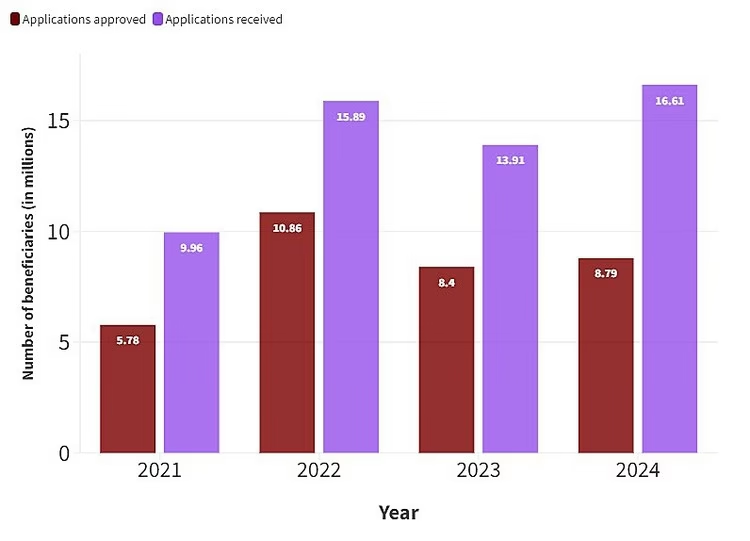Rules for R370-a-month Social Grant to be Challenged in Court This November

The South African social grant system, which provides financial assistance to individuals in need, has recently faced scrutiny in the courts.
The R370-a-month grant, introduced as part of emergency relief measures, is now at the center of legal challenges set to take place in November.
This article delves into the various legal, financial, and social implications of this grant, examining the arguments for and against its continuation and the broader effects on the South African population.
Understanding the R370-a-Month Social Grant
The R370 monthly grant, also known as the Special Covid-19 Social Relief of Distress (SRD) grant, was introduced in response to the economic challenges exacerbated by the COVID-19 pandemic. The South African government implemented the grant to provide relief to individuals who found themselves in financial distress due to the loss of income, particularly in the informal sector, where many workers were directly affected by lockdown measures.
The R370 grant, though modest, was seen as a lifeline for millions of South Africans during the pandemic. However, as the country’s economic situation continues to evolve, the need for such emergency relief has been called into question, especially as the government faces mounting financial pressures.

The Legal Challenge Against the R370 Grant
In November, a legal challenge to the R370-a-month social grant will be heard in the courts. This case brings into focus the tension between government financial constraints and the ongoing need for social assistance programs. The key arguments in the case revolve around the sustainability of the grant, the legal grounds for its continued implementation, and whether it meets constitutional requirements for social welfare.
Arguments in Favor of the R370 Grant
Proponents of the R370 social grant argue that the assistance provided is essential for the survival of millions of South Africans, especially those in vulnerable populations. The pandemic has left many without stable income, and the social safety net remains crucial for maintaining basic living standards.
- Economic Relief for Vulnerable Groups: Many South Africans, particularly in the informal sector, are still struggling to recover from the economic shock of the pandemic. For these individuals, the R370 grant is one of the few forms of immediate relief available.
- Constitutional Right to Social Security: The South African Constitution guarantees the right to social security for all citizens, particularly those who are unable to support themselves. Supporters argue that the grant is in line with this constitutional obligation.
- Social Stability: By providing a financial cushion to millions of South Africans, the grant has contributed to social stability, helping to prevent unrest in economically disenfranchised communities.
Counterarguments Against the R370 Grant
On the other side, critics of the grant raise several concerns regarding its sustainability and effectiveness. These critics argue that continuing the R370 grant may place further strain on an already overstretched public budget, particularly as the country’s economic recovery remains slow.
- Unsustainable Fiscal Pressure: South Africa’s fiscal situation is precarious, and critics argue that continuing the R370 grant without a clear funding mechanism will only deepen the country’s debt burden.
- Insufficient Impact on Poverty Alleviation: While the R370 grant has provided temporary relief, critics argue that it is not enough to significantly reduce poverty or improve long-term outcomes for South Africans. The amount is widely regarded as inadequate to meet the basic needs of most beneficiaries.
- Dependency on State Support: Some argue that long-term reliance on social grants may discourage individuals from seeking gainful employment, fostering a culture of dependency that ultimately harms economic growth.
The Broader Economic Impact of Social Grants
Social grants have long been a cornerstone of South Africa’s welfare state, helping millions of South Africans survive economic hardship. However, as the country grapples with its economic challenges, the question arises: how sustainable are these grants in the long run?
The Role of Social Grants in Economic Stability
Social grants play a crucial role in reducing poverty and providing income security for vulnerable groups. They also contribute to economic stability by stimulating local consumption, as recipients typically spend the grant funds on basic goods and services. This has a multiplier effect, boosting local economies and supporting small businesses.
Short-Term Economic Stimulus
In the short term, social grants can act as an economic stimulus. By putting money directly into the hands of the poorest citizens, the grants encourage spending on essentials, driving demand in local economies. During times of economic contraction, this type of stimulus is particularly important as it can help maintain demand for goods and services.
Long-Term Implications for Poverty Reduction
While social grants have a direct impact on reducing poverty, their long-term effectiveness in addressing structural inequality is less clear. Without comprehensive policy measures to promote economic growth, job creation, and skills development, the reliance on grants may limit broader improvements in living standards. The focus must shift towards creating sustainable livelihoods for South Africa’s poor, rather than relying on temporary handouts.
The Need for Structural Reforms
The R370-a-month grant is a temporary measure, but its underlying issues highlight the need for broader social and economic reforms. Addressing the root causes of poverty—such as lack of education, unemployment, and inequality—will require a more robust and multifaceted approach than simply providing temporary financial aid.
What Happens if the Court Rules Against the Grant?
If the court rules against the continuation of the R370-a-month social grant, it could have significant consequences for both the beneficiaries and the broader social welfare system.
Immediate Consequences for Beneficiaries
A decision to end or reduce the R370 grant would directly affect millions of South Africans who rely on it for basic survival. Without an alternative safety net in place, many individuals and families would face increased hardship. The termination of the grant could lead to greater social unrest, particularly in impoverished areas where alternatives for financial support are scarce.
Long-Term Impact on Social Welfare Policies
A ruling against the grant could also have long-term implications for South Africa’s social welfare policies. It may set a precedent for reducing or eliminating other social grants, such as child support grants and pensions. This could exacerbate existing inequality and push more people into poverty, undermining years of progress in social welfare.
Conclusion: The Future of the R370 Grant
As South Africa faces a critical moment in its post-pandemic recovery, the legal challenge to the R370-a-month social grant will be a pivotal moment in determining the future of social welfare in the country. Whether the grant is upheld or overturned, it is clear that South Africa must address the broader issues of economic inequality and unemployment to ensure long-term stability and prosperity for all its citizens.
South Africa’s social safety nets, while important, must be part of a larger strategy to promote economic growth, reduce poverty, and empower citizens. Moving forward, the government must balance the need for immediate relief with sustainable solutions that foster economic independence and long-term prosperity.

I’m Luan Arno, the owner of Check-SASSA.co.za, where I help South Africans navigate SASSA services. As a father of two living in Johannesburg, I’m passionate about making essential information accessible to those in need. With a background in community service and digital communications, I aim to simplify the process of checking benefits. When I’m not working, I love exploring our beautiful country with my family. Thank you for visiting Check-SASSA!






